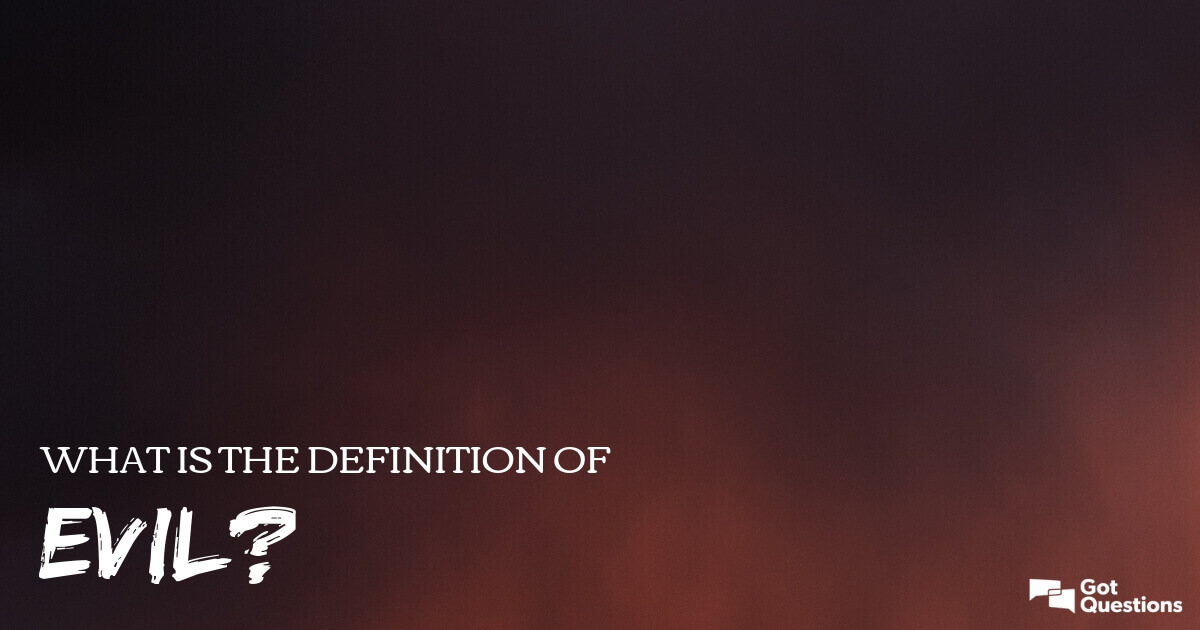OK
We leave it here.
But it'll be difficult to have a discussion on this even with other members because you're using the secular meaning, not the biblical meaning.

Is this helpful?
Evil, Evil-doer
A. Adjectives.
1.
kakos (G2556) stands for "whatever is evil in character, base," in distinction (wherever the distinction is observable) from poneros (see No. 2), which indicates "what is evil in influence and effect, malignant." Kakos is the wider term and often covers the meaning of poneros. Kakos is antithetic to kalos, "fair, advisable, good in character," and to agathos, "beneficial, useful, good in act"; hence it denotes what is useless, incapable, bad; poneros is essentially antithetic to chrestos, "kind, gracious, serviceable"; hence it denotes what is destructive, injurious, evil. As evidence that poneros and kakos have much in common, though still not interchangeable, each is used of thoughts, cf. Mat_15:19 with Mar_7:21; of speech, Mat_5:11 with 1Pe_3:10; of actions, 2Ti_4:18 with 1Th_5:15; of man, Mat_18:32 with Mat_24:48.
The use of kakos may be broadly divided as follows: (a) of what is morally or ethically "evil," whether of persons, e.g., Mat_21:41; Mat_24:48; Php_3:2; Rev_2:2, or qualities, emotions, passions, deeds, e.g., Mar_7:21; Joh_18:23, Joh_18:30; Rom_1:30; Rom_3:8; Rom_7:19, Rom_7:21; Rom_13:4; Rom_14:20; Rom_16:19; 1Co_13:5; 2Co_13:7; 1Th_5:15; 1Ti_6:10; 2Ti_4:14; 1Pe_3:9, 1Pe_3:12; (b) of what is injurious, destructive, baneful, pernicious, e.g., Luk_16:25; Act_16:28; Act_28:5; Tit_1:12; Jas_3:8; Rev_16:2, where kakos and poneros come in that order, "noisome and grievous." See B, No. 3. For compounds of kakos, see below.
2.
poneros (G4190), akin to ponos, "labor, toil," denotes "evil that causes labor, pain, sorrow, malignant evil" (see No. 1); it is used (a) with the meaning bad, worthless, in the physical sense, Mat_7:17-18; in the moral or ethical sense, "evil," wicked; of persons, e.g., Mat_7:11; Luk_6:45; Act_17:5; 2Th_3:2; 2Ti_3:13; of "evil" spirits, e.g., Mat_12:45; Luk_7:21; Act_19:12-13, Act_19:15-16; of a generation, Mat_12:39, Mat_12:45; Mat_16:4; Luk_11:29; of things, e.g., Mat_5:11; Mat_6:23; Mat_20:15; Mar_7:22; Luk_11:34; Joh_3:19; Joh_7:7; Act_18:14; Gal_1:4; Col_1:21; 1Ti_6:4; 2Ti_4:18; Heb_3:12; Heb_10:22; Jas_2:4; Jas_4:16; 1Jn_3:12; 2Jn_1:11; 3Jn_1:10; (b) with the meaning toilsome, painful, Eph_5:16; Eph_6:13; Rev_16:2. Cf. poneria, "iniquity, wickedness." For its use as a noun see B, No. 2.
3.
phaulos (G5337) primarily denotes "slight, trivial, blown about by every wind"; then, "mean, common, bad," in the sense of being worthless, paltry or contemptible, belonging to a low order of things; in Joh_5:29, those who have practiced "evil" things, RV, "ill" (phaula), are set in contrast to those who have done good things (agatha); the same contrast is presented in Rom_9:11 and 2Co_5:10, in each of which the most authentic mss. have phaulos for kakos; he who practices "evil" things (RV, "ill") hates the light, Joh_3:20; jealousy and strife are accompanied by "every vile deed," Jas_3:16. It is used as a noun in Tit_2:8 (see B, No. 4). See BAD, ILL, VILE.
B. Nouns.
1.
kakia (G2549), primarily, "badness" in quality (akin to A, No. 1), denotes (a) "wickedness, depravity, malignity," e.g., Act_8:22, "wickedness"; Rom_1:29, "maliciousness"; in Jas_1:21, KJV, "naughtiness"; (b) "the evil of trouble, affliction," Mat_6:34, only, and here alone translated "evil." see MALICE, MALICIOUSNESS, NAUGHTINESS, WICKEDNESS.
2.
poneros (G4190), the adjective (A, No. 2), is used as a noun, (a) of Satan as the "evil" one, Mat_5:37; Mat_6:13; Mat_13:19, Mat_13:38; Luk_11:4 (in some texts); Joh_17:15; Eph_6:16; 2Th_3:3; 1Jn_2:13-14; 1Jn_3:12; 1Jn_5:18-19; (b) of human beings, Mat_5:45; (probably Mat_5:39); Mat_13:49; Mat_22:10; Luk_6:35; 1Co_5:13; (c) neuter, "evil (things)," Mat_9:4; Mat_12:35; Mar_7:23; Luk_3:19; "that which is evil," Luk_6:45; Rom_12:9; Act_28:21, "harm."
3.
kakon (G2556), the neuter of A, No. 1, is used with the article, as a noun, e.g., Act_23:9; Rom_7:21; Heb_5:14; in the plural, "evil things," e.g., 1Co_10:6; 1Ti_6:10, "all kinds of evil," RV.
4.
phaulon (G5337), the neuter of A, No. 3, is used as a noun in Tit_2:8.
5. kakopoios (G2555), properly the masculine gender of the adjective, denotes an "evil-doer" (kakon, "evil," poieo, "to do"), 1Pe_2:12, 1Pe_2:14; 1Pe_4:15; in some mss. in 1Pe_3:16 and Joh_18:30 (so the KJV). For a synonymous word see Note (1). Cf. the verb below. In the Sept., Pro_12:4; Pro_24:19. See MALEFACTOR.
Notes: (1) Kakourgos, "an evil-worker" (kakon, "evil," ergon, "a work"), is translated "evil-doer" in 2Ti_2:9, KJV (RV, "malefactor"). Cf. Luk_23:32-33, Luk_23:39.
(2)
Adikema, "an injustice" (a, negative, dikaios, "just"), is translated "evil-doing," in Act_24:20, KJV, RV, "wrong-doing." see INIQUITY, WRONG.
C. Verbs.
1.
kakoo (G2559), "to ill-treat" (akin to A, No. 1), is rendered "to entreat evil" in Act_7:6, Act_7:19; "made (them) evil affected," Act_14:2. See AFFECT, AFFLICT, HARM, HURT, VEX.
2.
kakopoieo (G2554) signifies "to do evil" (cf. B, No. 5), Mar_3:4 (RV, "to do harm"); so, Luk_6:9; in 3Jn_1:11, "doeth evil"; in 1Pe_3:17, "evil doing." see HARM.
Note: Cf. kakologeo, "to speak evil" (see CURSE, SPEAK); kakopatheo, "to endure evil" (see ENDURE, SUFFER); kakopatheia, suffering affliction" (see SUFFER); kakoucheo, "to suffer adversity" (see SUFFER).
D. Adverb.
kakos (G2560), "badly, evilly," akin to A, No. 1, is used in the physical sense, "to be sick," e.g., Mat_4:24; Mar_1:32, Mar_1:34; Luk_5:31 (see DISEASE). In Mat_21:41 this adverb is used with the adjective, "He will miserably destroy those miserable men," more lit., "He will evilly destroy those men (evil as they are)," with stress on the adjective; (b) in the moral sense, "to speak evilly," Joh_18:23; Act_23:5; to ask evilly, Jas_4:3.
See AMISS, GRIEVOUSLY, SICK, SORE.
It would be good to look up the references to see the context.
.






